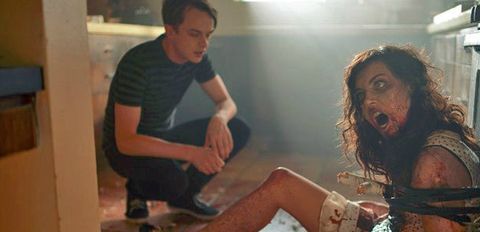What is Life After Beth? The directorial debut of I Heart Huckabee's co-writer Jeff Baena feels like its at the intersection of John Waters and David Lynch in its depiction of suburbia. It's where pale-faced young Zach (Dane DeHaan) wastes the days away pining for his dead girlfriend Beth (Aubrey Plaza), listlessly counting the hours with his banal parents and militaristic brother. Like most depictions of suburbia, there's something that feels frozen about this place – it takes place in a contemporary world, but the milieu feels like it could be from 1989, or 1994, or 2002. Zach's emotions are downright apocalyptic: he'll never love again, ergo nothing will ever change.
His escape comes from the relatively chill presence of Beth's parents (John C. Reilly, Molly Shannon), who quietly grieve in private. But one day, he's no longer invited over. The Slocums' disappear, leaving Zach alone in his existential void. When he forces himself back into their lives, mostly in search of a grief partner, he finds Beth. Alive and well, she embraces Zach like nothing had ever happened. Purposely keeping her in the dark, her parents proclaim it a “miracle.” Their panicked search for justification over meaning is a sly commentary on religion, particularly considering we're dealing with a fully resurrected character.
The film slowly doles out hints regarding what we can gather from the film's presold premise: Beth is a full-blown flesh-eating zombie. The movie trafficks in well-worn staples of the genre: a bite turns you into one, the skin randomly decays. It also plays fast and loose with the rest of the zombie rules, knowing full well that audiences only know a couple. Which is maddening from a storytelling perspective. Beth lurches from articulate but manic, to deranged and shouting. At first it seems like there's meaning behind the fact that smooth jazz calms her, but it only turns out to be a dumb gag of violence and bloodshed occurring while a sax wails on the soundtrack. The first couple of times, it's sort of amusing.
Life After Beth is content to meander a bit throughout its runtime, ditching story momentum in favor of its overqualified cast. Plaza is very funny as the cursed Beth, and you forgive the film's inconsistent characterization simply because of the dedication to mental instability. When she goes full-on feral (which is something that inexplicably fluctuates), Plaza absolutely transformers, and you have to remind yourself it's the same actress from earlier who was kissing and flirting with our lead. Reilly and Shannon are excellent casting decisions not because they're funny people but because they understand how to mine comic material for the humanity within. Anna Kendrick shows up as a potential new girlfriend for Zach, and their chemistry so warm (and Kendrick's smile so typically radiant) that you don't mind that she seems considerably older than him and that the film doesn't know what to do with her.
At about the hour mark, the movie feels like it runs out of ideas as it half-heartedly commits to the genre-trappings of a zombie movie. On a budget, the zombie apocalypse occurs – Baena stumbles upon a funny idea of having the dead rise and return right back to their homes, where they kvetch about the current tenants as they decompose. But it's merely a cheap sight gag, one of many that buoys the mixed messages of the end, which lets Beth's ferocity function as an excuse for why she becomes a prop to allow Zach to let go. The metaphor feels like a mess here: does Zach need to let go because Beth is dead? Because she's standing right over there, and she's still got thoughts and opinions, and she still loves you. Or does Zach need to get out of a teenage relationship to live an adult life? Is he even going to college? And what was a pre-death Beth even like?
DeHaan in particular is such an interesting, intense actor, with obvious shades of DiCaprio. As he is the butt of various zombie jokes, playing off Plaza, you wonder, why is he here? This film needed more of a casual everyman struggling to make sense out of the supernatural. It needs direct, simple emotions from an actor who can convey broad, simple ideas. But DeHaan is more haunted, driven, and the jury's out on whether he can actually do comedy. The film insists its something of a light comedy with horror undertones, but it keeps mis-stepping into brutality and cynicism almost out of obligation. At its end, it's still trying to convince you of the romantic comedy aspect of the entire affair, but as soon as DeHaan grabs a gun, you might get sick of all these genres at war with each other.
Most Popular



